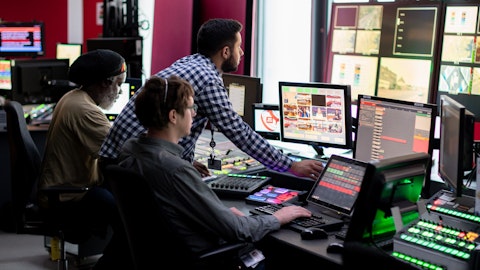Joey Levin: Sure. On Decipher, I think you hit the main point, Brian which is — intent is a very powerful indicator for ad performance, and I think much more powerful, and based on our testing, much more powerful than cookies. And the good news is that cookies are being deprecated, and so the market I think is sort of forced in that direction regardless. Our intent data is, we think, pretty good and also pretty unique. You know, the best-performing ad platform in the world has exceptional intent, and we sort of follow in the wake of that with what we are able to gather in our platform with intent, and we expect that to really help overall Dotdash Meredith over the course of 2024. We’re seeing it in advertiser interest just in terms of responding to RFPs, but we’re also seeing it in advertiser spend in terms of making it a part of their campaigns.
And again, we expect that to continue, especially as we get better at mapping it broader across the Internet, broader across partners, and as it gets easier for partners or advertisers to buy that product from us, which is all stuff that we have underway. In terms of AI, look, we are going to defend our content. We’ve been clear about that, and I think that there’s one sort of small and relatively straightforward question that needs to be answered that hopefully, if it’s answered in the way we expect it will, we’ll get everybody to the table to get to reasonable conclusions, which is do these platforms have the right to take everybody’s content and transform it and use it for the purpose that they’re using it? We think the existing copyright law is pretty clear that they do not have the right to do that, but it will probably take a court to reach that determination, and once that happens, everybody can get together and figure out a solution that works for everybody in the ecosystem and that’s our plan.
There’s a number of those suits underway right now, and we expect that there will be a number more of those over time.
Brian Fitzgerald: Thanks, Joey. Appreciate it.
Joey Levin: Thank you. Operator, next question.
Operator: Our next question will come from Ygal Arounian with Citigroup. Please go ahead.
Ygal Arounian: Hey, good morning, guys. Two questions. First on Dotdash and not to beat a dead horse here on the macro, but we’ve heard over the course of earnings a lot more incremental concern on the consumer, especially in discretionary, and I know the e-commerce advertising and performance is really important. Do you guys have any insight there specifically that’s maybe different? I know you talked about a softer October, but it still sounds relatively hopeful around holiday. Just any insight on that, and then on Angi, you’re selling the roofing business, you’re paring down on services. Is that part of the business now where you want it to be, or is there still more with the chop there as well? Thanks.
Joey Levin : I’ll do the second one first. The services business, look, every business we want to always be better, but the services business is where we want it to be right now, meaning there are not other things that we are paring out of the services business. You can still see in the comp things down year-over-year, but that was when we were in the higher consideration managed projects business, and there is this final step in roofing. But where we are right now in services is a place from which we think we can build. We think it’s very healthy. We know it’s a very good customer experience, our best customer experience, and we’re excited to expand it. There is the reality in services, which services participates in service requests sort of downstream in Angi, which means that the services business revenue growth will be somewhat tied to what happens on demand overall and service requests overall at Angi.
But in terms of the business that we’re doing there and want to be doing there, I think that’s all in a healthy place and where we want it to be. And we’re happy to close the roofing chapter and move on from there. I’ve already forgotten the first question.
Christopher Halpin : Yes, and just one technical point related to the roofing transaction. We’re thrilled to have that business in the hands of a private third-party who will operate it well and it’s returned to being a customer. We flagged this in the footnote on Page 2 of the earnings release. But under GAAP, roofing will be a discontinued operation starting next quarter for Angi, but given materiality, will not be for IAC. So in order to keep the Angi financials consistent between what Angi will put out standalone and what is rolled up in IAC, we will move roofing on a historical basis into emerging another. On a go-forward basis, there will be no impact because we’ve sold the business, but just on a historical basis starting next quarter, roofing will be within emerging another and then will be a discontinued ops for Angie.
I’m sure we’ll continue to work through that to explain that with investors, but just one thing we wanted to flag. Your first question on Dotdash Meredith and what we’re seeing macro, we are vigilant on the point. You can’t have interest rates on consumers go from zero to five and higher percent without some impact. There are elements that are just distinct to DDM that we expect to grow and take share just because we didn’t have these integrations a year ago and the Meredith assets are such a big platform. But relative to expectations and broader trends, we’re looking. What is hard is that the cadence of e-commerce and holiday shopping keeps changing year to year. If you go back to 21, things were pulled forward because everyone was worried about the supply chain issues and not being able to get their child or loved one the right holiday present because they would run out.





